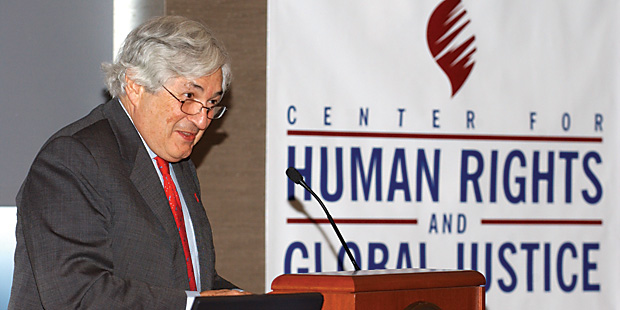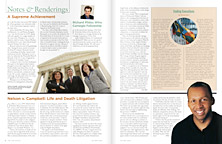Joining Forces to Ease Suffering
Printer Friendly VersionIn an overdue conference, human rights activists and development experts found they share common goals.
Development experts and human rights activists are logical allies, but until recently each tackled issues such as child labor, land rights or women’s empowerment in their own way. A deeper connection was formed last spring, however, at a conference entitled “Human Rights and Development: Toward Mutual Reinforcement,” co-sponsored by the Law School’s Center for Human Rights and Global Justice and the Ethical Globalization Initiative, with support from the World Bank.
World Bank President James Wolfensohn was the keynote speaker; discussions between other World Bank officials and human rights experts such as Mary Robinson, former United Nations High Commissioner for Human Rights and chairwoman of EGI, followed. “There was a time not so long ago when human rights discourse was almost always that of diplomats, lawyers and philosophers, while development thinking and writing was the domain of economists and other social scientists,” said Robinson, who also participated in the “Human Rights Perspectives on the Millennium Development Goals,” a Law School symposium sponsored by the Center for Human Rights and Global Justice. “Today, that gap is finally closing,” she said. “Development practitioners are finding that there are obvious—indeed, elephantine— human rights dimensions to many of the principal themes that occupy their attention.”
Wolfensohn also underscored the increasing overlap between development and human rights. “I’ve said to Mary many times: ‘You know, one of the things we have to do in our institution is to try and get things done, but to some of our shareholders the very mention of…human rights is inflammatory language.’ And, it’s getting into areas of politics, and it’s getting into areas that they’re very concerned about. We decide to just go around it and we talk the language of economics and social development.”
Wolfensohn went on to outline the difficulties of achieving the Millennium Development Goals—including eradicating extreme poverty and hunger and achieving universal primary education—that all 191 members of the United Nations have pledged to help make happen by 2015. “There’s a fair chance that statistically we will achieve the poverty goal,” he said. “But if you read the statistics, they are highly biased by China and India. And if you take a look at countries in sub- Saharan Africa you’ll find that statistics are, in fact, going in the other direction.”
Wolfensohn argued that these goals are difficult to reach because of a lack of focus and financing. “We talk about achieving the objectives because the world is united in support,” Wolfensohn said. “It’s nonsense. The world’s governments are spending 20 times the amount of development expenditures on military expenditures….We [the development community and the human rights community] have a common enemy: indifference. …By joining together [we can put] pressure on our leaders to make this world a more focused and…effective place in terms of development and in terms of rights.”
Last May, just two months after the conference, President Wolfensohn announced that he was putting forth a proposal to the World Bank board to promote a human rights-oriented method in the bank’s lending policies. “The institution has up until now refused to deal with its activities using a rights-based approach,” he said.

